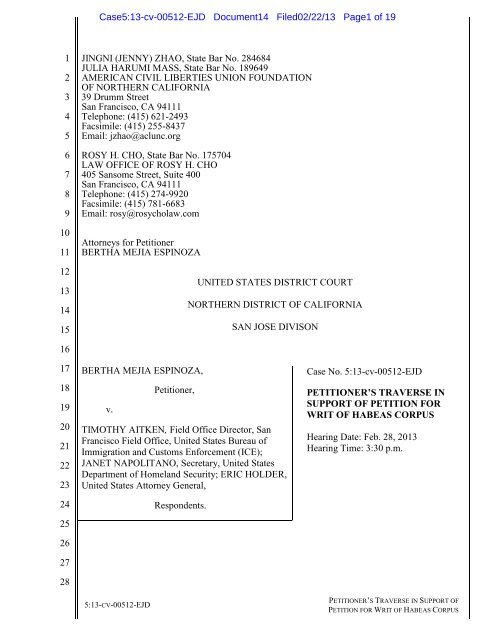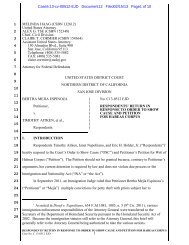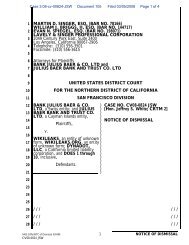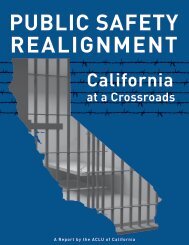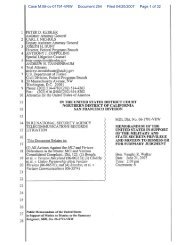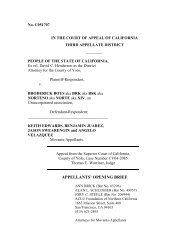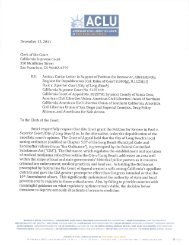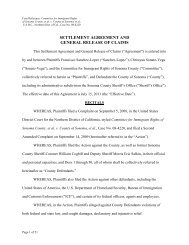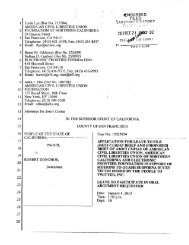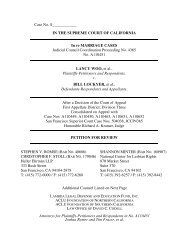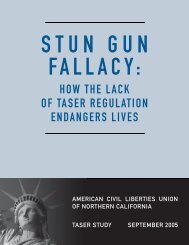Petitioners's Traverse in Support of Petition for Writ of Habeas Corpus
Petitioners's Traverse in Support of Petition for Writ of Habeas Corpus
Petitioners's Traverse in Support of Petition for Writ of Habeas Corpus
Create successful ePaper yourself
Turn your PDF publications into a flip-book with our unique Google optimized e-Paper software.
Case5:13-cv-00512-EJD Document14 Filed02/22/13 Page1 <strong>of</strong> 19<br />
1<br />
2<br />
3<br />
4<br />
5<br />
6<br />
7<br />
8<br />
9<br />
10<br />
11<br />
12<br />
13<br />
14<br />
15<br />
JINGNI (JENNY) ZHAO, State Bar No. 284684<br />
JULIA HARUMI MASS, State Bar No. 189649<br />
AMERICAN CIVIL LIBERTIES UNION FOUNDATION<br />
OF NORTHERN CALIFORNIA<br />
39 Drumm Street<br />
San Francisco, CA 94111<br />
Telephone: (415) 621-2493<br />
Facsimile: (415) 255-8437<br />
Email: jzhao@aclunc.org<br />
ROSY H. CHO, State Bar No. 175704<br />
LAW OFFICE OF ROSY H. CHO<br />
405 Sansome Street, Suite 400<br />
San Francisco, CA 94111<br />
Telephone: (415) 274-9920<br />
Facsimile: (415) 781-6683<br />
Email: rosy@rosycholaw.com<br />
Attorneys <strong>for</strong> <strong>Petition</strong>er<br />
BERTHA MEJIA ESPINOZA<br />
UNITED STATES DISTRICT COURT<br />
NORTHERN DISTRICT OF CALIFORNIA<br />
SAN JOSE DIVISON<br />
16<br />
17<br />
18<br />
19<br />
20<br />
21<br />
22<br />
23<br />
24<br />
25<br />
26<br />
27<br />
28<br />
BERTHA MEJIA ESPINOZA,<br />
v.<br />
5:13-CV-00512-EJD<br />
<strong>Petition</strong>er,<br />
TIMOTHY AITKEN, Field Office Director, San<br />
Francisco Field Office, United States Bureau <strong>of</strong><br />
Immigration and Customs En<strong>for</strong>cement (ICE);<br />
JANET NAPOLITANO, Secretary, United States<br />
Department <strong>of</strong> Homeland Security; ERIC HOLDER,<br />
United States Attorney General,<br />
Respondents.<br />
Case No. 5:13-cv-00512-EJD<br />
PETITIONER’S TRAVERSE IN<br />
SUPPORT OF PETITION FOR<br />
WRIT OF HABEAS CORPUS<br />
Hear<strong>in</strong>g Date: Feb. 28, 2013<br />
Hear<strong>in</strong>g Time: 3:30 p.m.<br />
PETITIONER’S TRAVERSE IN SUPPORT OF<br />
PETITION FOR WRIT OF HABEAS CORPUS
Case5:13-cv-00512-EJD Document14 Filed02/22/13 Page2 <strong>of</strong> 19<br />
1<br />
2<br />
3<br />
4<br />
5<br />
6<br />
7<br />
8<br />
9<br />
10<br />
11<br />
12<br />
13<br />
14<br />
15<br />
16<br />
17<br />
18<br />
19<br />
20<br />
21<br />
TABLE OF CONTENTS<br />
I. INTRODUCTION ....................................................................................................... 1<br />
II. STATEMENT OF FACTS .......................................................................................... 2<br />
III. ARGUMENT ............................................................................................................... 4<br />
A. Due Process Considerations Demand that Section 1226(c) be<br />
Construed Not to Authorize Prolonged Detention Without a Bond<br />
Hear<strong>in</strong>g. ............................................................................................................... 4<br />
1. Section 1226(c) Does Not Authorize Prolonged Mandatory<br />
Detention. ................................................................................................... 4<br />
2. <strong>Petition</strong>er’s Immigration Status Does Not Impact the<br />
Construction <strong>of</strong> Section 1226(c) to Avoid Due Process Concerns. ........... 8<br />
3. Prolonged Detention Without Review Raises Serious<br />
Constitutional Concerns Regardless <strong>of</strong> Whether a F<strong>in</strong>al Removal<br />
Order Has Been Entered and Detention Is Indef<strong>in</strong>ite................................. 9<br />
B. <strong>Petition</strong>er Is Not Properly Subject to Mandatory Detention Under<br />
Section 1226(c) Because She Was Not Deta<strong>in</strong>ed by ICE<br />
“When…Released” From Crim<strong>in</strong>al Custody. ..................................................... 11<br />
C. <strong>Petition</strong>er Is Not Properly Subject to Mandatory Detention Under<br />
Section 1226(c) Because She Has a Substantial Claim <strong>for</strong><br />
Immigration Relief. ............................................................................................. 13<br />
IV. CONCLUSION ............................................................................................................ 14<br />
22<br />
23<br />
24<br />
25<br />
26<br />
27<br />
28<br />
5:13-CV-00512-EJD<br />
i<br />
PETITIONER’S TRAVERSE IN SUPPORT OF<br />
PETITION FOR WRIT OF HABEAS CORPUS
Case5:13-cv-00512-EJD Document14 Filed02/22/13 Page3 <strong>of</strong> 19<br />
1<br />
2<br />
3<br />
CASES<br />
TABLE OF AUTHORITIES<br />
Pages<br />
4<br />
5<br />
6<br />
7<br />
8<br />
9<br />
10<br />
11<br />
12<br />
13<br />
14<br />
15<br />
16<br />
17<br />
18<br />
19<br />
20<br />
21<br />
22<br />
23<br />
24<br />
25<br />
26<br />
27<br />
28<br />
Alikhani v. Fasano,<br />
70 F. Supp. 2d 1124 (S.D. Cal 1999) ............................................................................ 11<br />
Casas-Castrillon v. Department <strong>of</strong> Homeland Security,<br />
535 F.3d 942 (9th Cir. 2008) .................................................................................. passim<br />
Castillo v. ICE Field Director,<br />
No. C12-502, 2012 WL 5511716 (W.D. Wash. Nov. 14, 2012) .................................. 13<br />
Centeno-Ortiz v. Culley,<br />
No. 11-1970, 2012 WL 170123 (S.D. Cal. Jan. 19, 2012) .............................................. 7<br />
Chen v. Aitken,<br />
No. 12-6024, 2013 WL 123618 (N.D. Cal. Jan. 8, 2013) ............................................... 7<br />
Clark v. Mart<strong>in</strong>ez,<br />
543 U.S. 371 (2005) ........................................................................................................ 8<br />
Demore v. Kim,<br />
538 U.S. 510 (2003) ............................................................................................... passim<br />
Diouf v. Napolitano,<br />
634 F.3d 1081 (9th Cir. 2011) ................................................................................ passim<br />
Foucha v. Louisiana,<br />
504 U.S. 71 (1992) ...................................................................................................... 4, 7<br />
Franco-Gonzales v. Holder,<br />
828 F. Supp. 2d 1133 (C.D. Cal. 2011)..................................................................... 7, 10<br />
Gonzalez v. O’Connell,<br />
355 F.3d 1010 (7th Cir. 2004) ....................................................................................... 13<br />
Hosh v. Lucero,<br />
680 F.3d 375 (4th Cir. 2012) ......................................................................................... 12<br />
Matter <strong>of</strong> Rojas,<br />
23 I. & N. Dec. 117 (BIA 2001) ................................................................................... 12<br />
Monestime v. Reilly,<br />
704 F. Supp. 2d 453 (S.D.N.Y. 2010) ........................................................................... 12<br />
Nimako v. Shanahan,<br />
No. 12-4909, 2012 WL 4121102 (D.N.J. Sept. 18, 2012) ............................................ 12<br />
Prieto-Romero v. Clark,<br />
534 F.3d 1053 (9th Cir. 2008) ................................................................................... 9, 10<br />
Quezada-Bucio v. Ridge,<br />
317 F. Supp. 2d 1221(W.D. Wash. 2004) ..................................................................... 11<br />
Rodriguez v. Hayes,<br />
591 F.3d 1105 (9th Cir. 2010) ..................................................................................... 4, 5<br />
Rodriguez v. Robb<strong>in</strong>s,<br />
CV07-03239 (C.D. Cal. filed May 16, 2007) ................................................................. 7<br />
Saysana v. Gillen,<br />
590 F.3d 7 (1st Cir. 2009) ............................................................................................. 11<br />
S<strong>in</strong>gh v. Holder,<br />
638 F.3d 1196 (9th Cir. 2011) ....................................................................................... 15<br />
5:13-CV-00512-EJD<br />
ii<br />
PETITIONER’S TRAVERSE IN SUPPORT OF<br />
PETITION FOR WRIT OF HABEAS CORPUS
Case5:13-cv-00512-EJD Document14 Filed02/22/13 Page4 <strong>of</strong> 19<br />
1<br />
2<br />
3<br />
4<br />
5<br />
6<br />
7<br />
8<br />
9<br />
10<br />
11<br />
12<br />
13<br />
14<br />
Tijani v. Willis,<br />
430 F.3d 1241 (9th Cir. 2005) ........................................................................... 1, 5, 9, 13<br />
United States v. Castiello,<br />
878 F.2d 554 (1st Cir. 1989) ......................................................................................... 14<br />
United States v. Montalvo-Murillo,<br />
495 U.S. 711 (1990) ...................................................................................................... 13<br />
United States v. Salerno,<br />
481 U.S. 739 (1987) ........................................................................................................ 1<br />
Victor v. Mukasey,<br />
No. 08-1914, 2008 WL 5061810 (M.D. Pa. Nov. 25, 2008) ........................................ 14<br />
Zadvydas v. Davis,<br />
533 U.S. 678 (2001) .......................................................................................... 1, 4, 8, 10<br />
STATUTES<br />
8 U.S.C. § 1225(b) .............................................................................................................. 7<br />
8 U.S.C. § 1226(a) ........................................................................................................ 6, 11<br />
8 U.S.C. § 1226(c) ..................................................................................................... passim<br />
8 U.S.C. § 1231(a) ...................................................................................................... 4, 6, 8<br />
RULES<br />
8 C.F.R. § 1241.1 ................................................................................................................ 9<br />
15<br />
16<br />
17<br />
18<br />
19<br />
20<br />
21<br />
22<br />
23<br />
24<br />
25<br />
26<br />
27<br />
28<br />
5:13-CV-00512-EJD<br />
iii<br />
PETITIONER’S TRAVERSE IN SUPPORT OF<br />
PETITION FOR WRIT OF HABEAS CORPUS
Case5:13-cv-00512-EJD Document14 Filed02/22/13 Page5 <strong>of</strong> 19<br />
1<br />
2<br />
3<br />
4<br />
5<br />
6<br />
7<br />
8<br />
9<br />
10<br />
11<br />
12<br />
13<br />
14<br />
15<br />
16<br />
17<br />
18<br />
19<br />
20<br />
21<br />
22<br />
23<br />
24<br />
25<br />
26<br />
27<br />
28<br />
I. INTRODUCTION<br />
For the past seventeen months, Respondents have held <strong>Petition</strong>er Bertha Mejia <strong>in</strong> a<br />
county jail without mak<strong>in</strong>g any show<strong>in</strong>g that her detention is warranted by risk <strong>of</strong> flight or<br />
danger to the community. Respondents’ prolonged detention <strong>of</strong> <strong>Petition</strong>er without even the<br />
basic process <strong>of</strong> a bond hear<strong>in</strong>g be<strong>for</strong>e an Immigration Judge defies the constitutional pr<strong>in</strong>ciple<br />
that “[i]n our society liberty is the norm, and detention prior to trial or without trial is the<br />
carefully limited exception.” United States v. Salerno, 481 U.S. 739, 755 (1987). Because<br />
Respondents lack the authority under the Immigration and Nationality Act or the United States<br />
Constitution to cont<strong>in</strong>ue deta<strong>in</strong><strong>in</strong>g <strong>Petition</strong>er without a bond hear<strong>in</strong>g, the <strong>Petition</strong> <strong>for</strong> <strong>Writ</strong> <strong>of</strong><br />
<strong>Habeas</strong> <strong>Corpus</strong> should be granted.<br />
Both the Supreme Court and the N<strong>in</strong>th Circuit have <strong>in</strong>voked due process considerations<br />
to adopt narrow<strong>in</strong>g constructions <strong>of</strong> immigration detention statutes that appear to confer<br />
sweep<strong>in</strong>g power to deta<strong>in</strong> noncitizens <strong>in</strong> removal proceed<strong>in</strong>gs. See, e.g., Zadvydas v. Davis, 533<br />
U.S. 678, 689 (2001) (<strong>in</strong>terpret<strong>in</strong>g statute not to authorize <strong>in</strong>def<strong>in</strong>ite detention); Casas-<br />
Castrillon v. Department <strong>of</strong> Homeland Security, 535 F.3d 942, 947 (9th Cir. 2008) (<strong>in</strong>terpret<strong>in</strong>g<br />
statute not to authorize prolonged mandatory detention). Under controll<strong>in</strong>g N<strong>in</strong>th Circuit law, 8<br />
U.S.C. § 1226(c) does not authorize <strong>Petition</strong>er’s prolonged mandatory detention. The N<strong>in</strong>th<br />
Circuit held <strong>in</strong> Tijani v. Willis, 430 F.3d 1241, 1242 (9th Cir. 2005), and Casas-Castrillon, 535<br />
F.3d at 947, that mandatory detention under § 1226(c) is authorized only where removal<br />
proceed<strong>in</strong>gs are “expedit[ious].” Subsequently, <strong>in</strong> Diouf v. Napolitano, 634 F.3d 1081, 1091-92<br />
(9th Cir. 2011), the N<strong>in</strong>th Circuit held that a rigorous bond hear<strong>in</strong>g is required at six months <strong>of</strong><br />
detention <strong>in</strong> order to avoid the serious constitutional problems presented by prolonged detention<br />
without adequate review. Because <strong>Petition</strong>er’s mandatory detention has long s<strong>in</strong>ce exceeded<br />
this period, she is entitled to an immediate bond hear<strong>in</strong>g be<strong>for</strong>e an Immigration Judge where the<br />
5:13-CV-00512-EJD 1<br />
PETITIONER’S TRAVERSE IN SUPPORT OF<br />
PETITION FOR WRIT OF HABEAS CORPUS
Case5:13-cv-00512-EJD Document14 Filed02/22/13 Page6 <strong>of</strong> 19<br />
1<br />
2<br />
3<br />
4<br />
5<br />
6<br />
7<br />
8<br />
9<br />
10<br />
11<br />
12<br />
13<br />
14<br />
15<br />
16<br />
17<br />
18<br />
19<br />
20<br />
21<br />
22<br />
23<br />
24<br />
25<br />
26<br />
27<br />
28<br />
government must justify her cont<strong>in</strong>ued detention by clear and conv<strong>in</strong>c<strong>in</strong>g evidence.<br />
Aga<strong>in</strong>st the weight <strong>of</strong> the law, Respondents attempt to dist<strong>in</strong>guish these precedents by<br />
highlight<strong>in</strong>g two irrelevant factors. First, <strong>Petition</strong>er’s lack <strong>of</strong> lawful permanent residence has no<br />
bear<strong>in</strong>g on the <strong>in</strong>terpretation <strong>of</strong> § 1226(c). Because the statute applies uni<strong>for</strong>mly to lawful<br />
permanent residents (“LPRs”) and non-LPRs, it must be construed <strong>in</strong> view <strong>of</strong> its applications to<br />
both groups. Second, Respondents argue that only <strong>in</strong>def<strong>in</strong>ite detention after entry <strong>of</strong> a f<strong>in</strong>al<br />
removal order raises serious constitutional concerns. But the N<strong>in</strong>th Circuit has held that the<br />
constitutional concerns posed by prolonged detention without adequate review do not turn on<br />
the procedural posture <strong>of</strong> the noncitizen’s removal case.<br />
Respondents barely addressed <strong>Petition</strong>er’s two additional claims <strong>for</strong> relief aga<strong>in</strong>st her<br />
mandatory detention. First, <strong>Petition</strong>er should not have been held <strong>in</strong> mandatory detention <strong>in</strong> the<br />
first place because she was not deta<strong>in</strong>ed by immigration authorities “when…released” from<br />
crim<strong>in</strong>al custody as the statute requires, but almost a year after her release. Second, <strong>Petition</strong>er is<br />
not properly subject to mandatory detention because she has a substantial claim <strong>for</strong> relief from<br />
removal.<br />
II. STATEMENT OF FACTS<br />
Over thirty years ago, <strong>Petition</strong>er arrived <strong>in</strong> the United States after flee<strong>in</strong>g political<br />
violence, sexual abuse, and poverty <strong>in</strong> her native El Salvador. <strong>Petition</strong> 15-17. <strong>Petition</strong>er has<br />
struggled with the last<strong>in</strong>g psychological effects <strong>of</strong> childhood physical and sexual abuse and has<br />
been convicted several times <strong>of</strong> m<strong>in</strong>or, nonviolent <strong>of</strong>fenses, primarily petty theft <strong>of</strong> grocery<br />
items. Id. 19. Her last shoplift<strong>in</strong>g arrest, <strong>for</strong> which she spent less than a day <strong>in</strong> jail, occurred<br />
<strong>in</strong> October 2010. Id. 20.<br />
Nearly a year later, on September 17, 2011, Immigration and Customs En<strong>for</strong>cement<br />
(“ICE”) placed <strong>Petition</strong>er <strong>in</strong> immigration detention and <strong>in</strong>stituted removal proceed<strong>in</strong>gs aga<strong>in</strong>st<br />
5:13-CV-00512-EJD 2<br />
PETITIONER’S TRAVERSE IN SUPPORT OF<br />
PETITION FOR WRIT OF HABEAS CORPUS
Case5:13-cv-00512-EJD Document14 Filed02/22/13 Page7 <strong>of</strong> 19<br />
1<br />
2<br />
3<br />
4<br />
5<br />
6<br />
7<br />
8<br />
9<br />
10<br />
11<br />
12<br />
13<br />
14<br />
15<br />
16<br />
17<br />
18<br />
19<br />
20<br />
21<br />
22<br />
23<br />
24<br />
25<br />
26<br />
27<br />
28<br />
her. Id. <strong>Petition</strong>er has applied <strong>for</strong> and cont<strong>in</strong>ues to pursue two avenues <strong>of</strong> immigration relief.<br />
In Immigration Court, she sought asylum and withhold<strong>in</strong>g <strong>of</strong> removal. The Immigration Judge<br />
(“IJ”) denied relief on these grounds <strong>in</strong> August 2012 and <strong>Petition</strong>er appealed the IJ’s decision to<br />
the Board <strong>of</strong> Immigration Appeals (“BIA”). Id. 22, 24. Through a separate process<br />
adm<strong>in</strong>istered by United States Citizenship and Immigration Services (“USCIS”), <strong>Petition</strong>er<br />
applied <strong>for</strong> a U visa as a victim <strong>of</strong> rape by her employer. Although her <strong>in</strong>itial submission was<br />
denied, <strong>Petition</strong>er filed a renewed U visa application through new counsel <strong>in</strong> December 2012.<br />
Id. 23, 25. In January 2013, the BIA remanded <strong>Petition</strong>er’s asylum and withhold<strong>in</strong>g case to<br />
the IJ to await adjudication <strong>of</strong> the U visa application by USCIS. Id. 25. <strong>Petition</strong>er’s next<br />
master calendar hear<strong>in</strong>g be<strong>for</strong>e the IJ is scheduled <strong>for</strong> March 26, 2013. 1 Return at 4.<br />
S<strong>in</strong>ce her arrest by ICE <strong>in</strong> September 2011, <strong>Petition</strong>er has rema<strong>in</strong>ed <strong>in</strong> immigration<br />
detention while she fights to rema<strong>in</strong> <strong>in</strong> the United States with her family. <strong>Petition</strong> 26. ICE<br />
asserts that due to her petty theft convictions, <strong>Petition</strong>er is subject to mandatory detention under<br />
§ 1226(c) and <strong>in</strong>eligible <strong>for</strong> a bond hear<strong>in</strong>g, even as her time <strong>in</strong> detention approaches a year and<br />
a half. Id. 20. The IJ agreed with ICE that he lacked the authority to conduct a bond hear<strong>in</strong>g<br />
and denied <strong>Petition</strong>er’s motions <strong>for</strong> bond redeterm<strong>in</strong>ation <strong>in</strong> October 2012 and January 2013.<br />
Id. 26.<br />
<strong>Petition</strong>er has no serious or violent crim<strong>in</strong>al history and has never been sentenced to<br />
more than 45 days <strong>in</strong> jail <strong>for</strong> any <strong>of</strong>fense. Id. 19. She is not a threat to the community.<br />
Because <strong>Petition</strong>er has a pend<strong>in</strong>g U visa application and is responsible <strong>for</strong> the care <strong>of</strong> her young<br />
grandson, her risk <strong>of</strong> flight is extremely low. Id. 27. However, <strong>Petition</strong>er has never had the<br />
opportunity to argue be<strong>for</strong>e a neutral decisionmaker that her detention is unwarranted because<br />
1 Contrary to Respondents’ suggestion, <strong>Petition</strong>er must await a decision by USCIS on her U visa<br />
application; the IJ will not decide that question at the March 26 hear<strong>in</strong>g, or at any other time.<br />
Return at 6.<br />
5:13-CV-00512-EJD 3<br />
PETITIONER’S TRAVERSE IN SUPPORT OF<br />
PETITION FOR WRIT OF HABEAS CORPUS
Case5:13-cv-00512-EJD Document14 Filed02/22/13 Page8 <strong>of</strong> 19<br />
1<br />
she poses no danger to society and will reliably appear <strong>in</strong> her immigration proceed<strong>in</strong>gs.<br />
2<br />
3<br />
4<br />
III.<br />
ARGUMENT<br />
A. Due Process Considerations Demand that Section 1226(c) be Construed Not<br />
to Authorize Prolonged Detention Without a Bond Hear<strong>in</strong>g.<br />
5<br />
6<br />
7<br />
8<br />
9<br />
10<br />
11<br />
12<br />
13<br />
14<br />
15<br />
16<br />
17<br />
18<br />
19<br />
20<br />
21<br />
22<br />
23<br />
24<br />
25<br />
26<br />
27<br />
28<br />
In a series <strong>of</strong> cases <strong>in</strong>volv<strong>in</strong>g immigration detention, the Supreme Court and the N<strong>in</strong>th<br />
Circuit have held that “due process requires ‘adequate procedural protections’ to ensure that the<br />
government’s asserted justification <strong>for</strong> physical conf<strong>in</strong>ement ‘outweighs the <strong>in</strong>dividual’s<br />
constitutionally protected <strong>in</strong>terest <strong>in</strong> avoid<strong>in</strong>g physical restra<strong>in</strong>t.’” Casas-Castrillon, 535 F.3d at<br />
950 (quot<strong>in</strong>g Zadvydas, 533 U.S. at 690). Respondents’ emphasis on factual differences<br />
between these cases and <strong>Petition</strong>er’s case is misplaced because these basic due process<br />
pr<strong>in</strong>ciples are equally applicable <strong>in</strong> <strong>Petition</strong>er’s case.<br />
1. Section 1226(c) Does Not Authorize Prolonged Mandatory Detention.<br />
It is well established that “[f]reedom from imprisonment—from government custody,<br />
detention, or other <strong>for</strong>ms <strong>of</strong> physical restra<strong>in</strong>t—lies at the heart <strong>of</strong> the liberty that [the Due<br />
Process Clause] protects.” Zadvydas, 533 U.S. at 690 (cit<strong>in</strong>g Foucha v. Louisiana, 504 U.S. 71,<br />
80 (1992)). Guided by this constitutional pr<strong>in</strong>ciple, the Supreme Court and the N<strong>in</strong>th Circuit<br />
have consistently “read significant limitations” <strong>in</strong>to immigration statutes “<strong>in</strong> order to avoid their<br />
constitutional <strong>in</strong>validation.” Zadvydas, 533 U.S. at 689; Rodriguez v. Hayes, 591 F.3d 1105,<br />
1123 (9th Cir. 2010) (“In each case <strong>in</strong> which we have <strong>in</strong>terpreted the scope <strong>of</strong> various<br />
[immigration detention] statutes, our determ<strong>in</strong>ations have been guided, if not controlled, by the<br />
question <strong>of</strong> whether <strong>in</strong>def<strong>in</strong>ite or prolonged detention generat<strong>in</strong>g serious constitutional concerns<br />
is present.”).<br />
In Zadvydas, the Supreme Court read an implicit reasonableness limitation <strong>in</strong>to 8 U.S.C.<br />
§ 1231(a)(6), which governs the cont<strong>in</strong>ued detention <strong>of</strong> noncitizens whom the government fails<br />
to remove dur<strong>in</strong>g the 90-day period follow<strong>in</strong>g the completion <strong>of</strong> their immigration cases. 533<br />
5:13-CV-00512-EJD 4<br />
PETITIONER’S TRAVERSE IN SUPPORT OF<br />
PETITION FOR WRIT OF HABEAS CORPUS
Case5:13-cv-00512-EJD Document14 Filed02/22/13 Page9 <strong>of</strong> 19<br />
1<br />
2<br />
3<br />
4<br />
5<br />
6<br />
7<br />
8<br />
9<br />
10<br />
11<br />
12<br />
13<br />
14<br />
15<br />
16<br />
17<br />
18<br />
19<br />
20<br />
21<br />
22<br />
23<br />
24<br />
25<br />
26<br />
27<br />
28<br />
U.S. at 689. The Court decl<strong>in</strong>ed to adopt the government’s literal read<strong>in</strong>g <strong>of</strong> the statute, whose<br />
language places no explicit limit on the length <strong>of</strong> time that a noncitizen can be deta<strong>in</strong>ed.<br />
Instead, it held that “once removal is no longer reasonably <strong>for</strong>eseeable, cont<strong>in</strong>ued detention is<br />
no longer authorized by statute” because “[a] statute permitt<strong>in</strong>g <strong>in</strong>def<strong>in</strong>ite detention <strong>of</strong> an alien<br />
would raise a serious constitutional problem.” Id. at 699, 690.<br />
Although the Supreme Court <strong>in</strong> Demore v. Kim upheld 8 U.S.C. § 1226(c), the statute at<br />
issue here, the Demore decision did not address whether the statute authorizes the prolonged<br />
mandatory detention to which <strong>Petition</strong>er has been subjected. 538 U.S. 510 (2003). In fact, “<strong>in</strong><br />
uphold<strong>in</strong>g Section 1226(c), the Court <strong>in</strong>terpreted it to authorize mandatory detention only <strong>for</strong><br />
the ‘limited period <strong>of</strong> [the alien’s] removal proceed<strong>in</strong>gs’”—typically no more than five months.<br />
Rodriguez, 591 F.3d at 1116 (quot<strong>in</strong>g Demore, 538 U.S. at 531). Two N<strong>in</strong>th Circuit decisions<br />
have confirmed that “Demore’s limited hold<strong>in</strong>g that Congress could permissibly authorize<br />
‘brief’ detention without procedural protections” cannot be extended to prolonged detentions<br />
under § 1226(c). Casas-Castrillon, 535 F.3d at 950; Tijani, 430 F.3d at 1242. First, <strong>in</strong> Tijani,<br />
the N<strong>in</strong>th Circuit <strong>in</strong>terpreted the authority conferred by § 1226(c) as apply<strong>in</strong>g only to<br />
“expeditious” removal proceed<strong>in</strong>gs <strong>in</strong> order to avoid decid<strong>in</strong>g the constitutional issue posed by<br />
the petitioner’s mandatory detention <strong>of</strong> over two years. 430 F.3d at 1242.<br />
The N<strong>in</strong>th Circuit aga<strong>in</strong> limited the reach <strong>of</strong> § 1226(c) to avoid constitutional concerns<br />
<strong>in</strong> Casas-Castrillon. 535 F.3d 942. Casas-Castrillon’s removal order had been affirmed by the<br />
BIA and he rema<strong>in</strong>ed <strong>in</strong> detention while he sought judicial review. The Court held that<br />
§ 1226(c) ceased to authorize Casas-Castrillon’s detention <strong>for</strong> two reasons: (1) § 1226(c) only<br />
authorizes mandatory detention where proceed<strong>in</strong>gs are “‘expedited,’” id. at 947 (quot<strong>in</strong>g Tijani,<br />
430 F.3d at 1242); and (2) § 1226(c) applies only “pend<strong>in</strong>g [adm<strong>in</strong>istrative] removal<br />
proceed<strong>in</strong>gs,” which concluded once the BIA ordered his removal. Id. at 948 (<strong>in</strong>ternal quotation<br />
5:13-CV-00512-EJD 5<br />
PETITIONER’S TRAVERSE IN SUPPORT OF<br />
PETITION FOR WRIT OF HABEAS CORPUS
Case5:13-cv-00512-EJD Document14 Filed02/22/13 Page10 <strong>of</strong> 19<br />
1<br />
2<br />
3<br />
4<br />
5<br />
6<br />
7<br />
8<br />
9<br />
10<br />
11<br />
12<br />
13<br />
14<br />
15<br />
16<br />
17<br />
18<br />
19<br />
20<br />
21<br />
22<br />
23<br />
24<br />
25<br />
26<br />
27<br />
28<br />
marks and citation omitted). Thus, the basis <strong>for</strong> Casas-Castrillon’s detention shifted to<br />
§ 1226(a), under which he was entitled to a bond hear<strong>in</strong>g be<strong>for</strong>e an Immigration Judge. Id.<br />
Moreover, the Court held broadly that “prolonged detention must be accompanied by<br />
appropriate procedural safeguards, <strong>in</strong>clud<strong>in</strong>g a hear<strong>in</strong>g to establish whether releas<strong>in</strong>g the alien<br />
would pose a danger to the community or a flight risk.” Id. at 944. The same fundamental due<br />
process pr<strong>in</strong>ciple applies equally to <strong>Petition</strong>er’s prolonged detention.<br />
In extend<strong>in</strong>g Casas-Castrillon to a new set <strong>of</strong> facts <strong>in</strong> Diouf v. Napolitano, the N<strong>in</strong>th<br />
Circuit affirmed that a noncitizen’s due process <strong>in</strong>terest <strong>in</strong> freedom from prolonged detention<br />
without a bond hear<strong>in</strong>g applies at any stage <strong>of</strong> the removal proceed<strong>in</strong>gs. 634 F.3d at 1087. The<br />
petitioner <strong>in</strong> Diouf was deta<strong>in</strong>ed under § 1231(a)(6) while litigat<strong>in</strong>g a motion to reopen, a <strong>for</strong>m<br />
<strong>of</strong> collateral challenge to a f<strong>in</strong>al removal order. Id. at 1084. The Court found no basis <strong>for</strong><br />
deny<strong>in</strong>g Diouf the bond hear<strong>in</strong>g accorded to Casas-Castrillon, not<strong>in</strong>g that the government made<br />
too much <strong>of</strong> the procedural dist<strong>in</strong>ctions between the two cases. Id. at 1086, 1087. “Regardless<br />
<strong>of</strong> the stage <strong>of</strong> the proceed<strong>in</strong>gs, the same important <strong>in</strong>terest [was] at stake—freedom from<br />
prolonged detention.” Id. at 1087 (emphasis added). As <strong>Petition</strong>er enjoys the same liberty<br />
<strong>in</strong>terest, she is likewise entitled to review <strong>of</strong> any factual justification <strong>for</strong> her prolonged<br />
detention.<br />
Thus, under N<strong>in</strong>th Circuit precedent, § 1226(c) does not to authorize <strong>Petition</strong>er’s<br />
prolonged detention without a bond hear<strong>in</strong>g. While Diouf held that detention generally becomes<br />
prolonged at six months, 634 F.3d at 1091, this Court need not determ<strong>in</strong>e the maximum length<br />
<strong>of</strong> mandatory detention under § 1226(c) because <strong>Petition</strong>er’s detention <strong>of</strong> seventeen months far<br />
exceeds the “brief” and “limited” period upheld by the Supreme Court <strong>in</strong> Demore. 538 U.S. at<br />
513, 526; see also Casas-Castrillon, 535 F.3d at 950 (“References to the brevity <strong>of</strong> mandatory<br />
detention under § 1226(c) run throughout Demore.”). With her case back be<strong>for</strong>e the IJ,<br />
5:13-CV-00512-EJD 6<br />
PETITIONER’S TRAVERSE IN SUPPORT OF<br />
PETITION FOR WRIT OF HABEAS CORPUS
Case5:13-cv-00512-EJD Document14 Filed02/22/13 Page11 <strong>of</strong> 19<br />
1<br />
2<br />
3<br />
4<br />
5<br />
6<br />
7<br />
8<br />
9<br />
10<br />
11<br />
12<br />
13<br />
14<br />
15<br />
16<br />
17<br />
18<br />
19<br />
20<br />
21<br />
22<br />
<strong>Petition</strong>er faces many more months <strong>in</strong> detention as she seeks relief from removal. Section<br />
1226(c) would be unconstitutional to the extent that it conferred such unlimited power on ICE to<br />
impose prolonged detention without the basic procedural safeguard <strong>of</strong> a bond hear<strong>in</strong>g be<strong>for</strong>e an<br />
IJ. See, e.g., Foucha v. Louisiana, 504 U.S. 71, 81-83 (1992) (strik<strong>in</strong>g down detention scheme<br />
<strong>for</strong> the mentally ill that af<strong>for</strong>ded the deta<strong>in</strong>ee a hear<strong>in</strong>g but placed the burden on the deta<strong>in</strong>ee to<br />
prove eligibility <strong>for</strong> release).<br />
This Court can avoid decid<strong>in</strong>g the constitutional question by adopt<strong>in</strong>g a narrow<strong>in</strong>g<br />
construction <strong>of</strong> the statute, as the Supreme Court and the N<strong>in</strong>th Circuit have done repeatedly <strong>in</strong><br />
immigration cases. Such an approach would also be consistent with several district court<br />
decisions with<strong>in</strong> this circuit that have ordered bond hear<strong>in</strong>gs <strong>in</strong> cases <strong>of</strong> prolonged mandatory<br />
detention, <strong>in</strong>clud<strong>in</strong>g Rodriguez v. Robb<strong>in</strong>s, CV07-03239 (C.D. Cal. filed May 16, 2007), where<br />
a subclass <strong>of</strong> § 1226(c) deta<strong>in</strong>ees held <strong>for</strong> over six months were granted prelim<strong>in</strong>ary <strong>in</strong>junctive<br />
relief. 2 See also Franco-Gonzales v. Holder, 828 F. Supp. 2d 1133, 1143 (C.D. Cal. 2011)<br />
(order<strong>in</strong>g bond hear<strong>in</strong>g where noncitizen’s detention under § 1226(c) was “well-beyond the<br />
outer limit <strong>of</strong> the five-month period estimated by the Demore Court”); Centeno-Ortiz v. Culley,<br />
No. 11-1970, 2012 WL 170123, at *9 (S.D. Cal. Jan. 19, 2012) (noncitizen <strong>in</strong> prolonged<br />
mandatory detention under 8 U.S.C. § 1225(b)(2)(A), govern<strong>in</strong>g detention <strong>of</strong> “arriv<strong>in</strong>g aliens,”<br />
was entitled to a bond hear<strong>in</strong>g); Chen v. Aitken, No. 12-6024, 2013 WL 123618, at *6 (N.D.<br />
Cal. Jan. 8, 2013) (same).<br />
23<br />
24<br />
25<br />
26<br />
27<br />
28<br />
2 Respondents misconstrue Rodriguez <strong>in</strong> the Return, claim<strong>in</strong>g that the district court ordered ICE<br />
to provide bond hear<strong>in</strong>gs to “essentially all non-citizens <strong>in</strong> removal proceed<strong>in</strong>gs <strong>in</strong> the Central<br />
District.” Return at 7-8 n.6. In fact, the district court certified subclasses <strong>of</strong> noncitizens deta<strong>in</strong>ed<br />
<strong>for</strong> more than six months under various immigration detention statutes and its order specifically<br />
perta<strong>in</strong>ed to two <strong>of</strong> those subclasses, <strong>in</strong>clud<strong>in</strong>g the § 1226(c) subclass—<strong>of</strong> which <strong>Petition</strong>er would<br />
be a member if she were held <strong>in</strong> the Central District. Order and Prelim. Inj. (Dkt. 255), Rodriguez<br />
v. Robb<strong>in</strong>s, CV07-03239 (C.D. Cal. Sept. 13, 2012).<br />
5:13-CV-00512-EJD 7<br />
PETITIONER’S TRAVERSE IN SUPPORT OF<br />
PETITION FOR WRIT OF HABEAS CORPUS
Case5:13-cv-00512-EJD Document14 Filed02/22/13 Page12 <strong>of</strong> 19<br />
1<br />
2<br />
3<br />
4<br />
5<br />
6<br />
7<br />
8<br />
9<br />
10<br />
11<br />
12<br />
13<br />
14<br />
15<br />
16<br />
17<br />
18<br />
19<br />
20<br />
21<br />
22<br />
23<br />
24<br />
25<br />
26<br />
27<br />
28<br />
2. <strong>Petition</strong>er’s Immigration Status Does Not Impact the Construction <strong>of</strong><br />
Section 1226(c) to Avoid Due Process Concerns.<br />
Contrary to Respondents’ assertions, the fact that <strong>Petition</strong>er is not an LPR is irrelevant to<br />
the question <strong>of</strong> statutory construction fac<strong>in</strong>g the Court because the statute must be construed<br />
such that it applies uni<strong>for</strong>mly to LPRs and non-LPRs alike. 3<br />
In Clark v. Mart<strong>in</strong>ez, the Supreme<br />
Court held that an immigration detention provision “applies without differentiation to all<br />
[noncitizens] that are its subject.” 543 U.S. 371, 378 (2005). The Court applied the limit<strong>in</strong>g<br />
construction <strong>of</strong> § 1231(a)(6) it adopted <strong>in</strong> Zadvydas to all classes <strong>of</strong> noncitizens subject to<br />
detention under the statute, <strong>in</strong>clud<strong>in</strong>g those who had never been admitted as LPRs—regardless<br />
<strong>of</strong> whether their detention raised the same constitutional concerns as the detention <strong>of</strong> the<br />
admitted noncitizens <strong>in</strong> Zadvydas. Id. As the Supreme Court expla<strong>in</strong>ed, courts must avoid<br />
<strong>in</strong>terpretations that present constitutional problems <strong>in</strong> some <strong>of</strong> the statute’s applications<br />
“whether or not those constitutional problems perta<strong>in</strong> to the particular litigant be<strong>for</strong>e the Court.”<br />
Id. at 381.<br />
Cit<strong>in</strong>g Clark, the N<strong>in</strong>th Circuit <strong>in</strong> Diouf rejected the very argument advanced by<br />
Respondents here. 634 F.3d at 1088 (“whether Diouf was a legal permanent resident is<br />
irrelevant”). Like the statute <strong>in</strong> Clark and Diouf, § 1226(c) “applies without differentiation to<br />
all [noncitizens] that are its subject.” Clark, 543 U.S. at 378. Because § 1226(c) must be<br />
applied <strong>in</strong> the same manner to LPRs and non-LPRs, whether <strong>Petition</strong>er herself is an LPR is<br />
irrelevant to how the statute must be construed.<br />
3 Although <strong>Petition</strong>er is not an LPR, it bears mention<strong>in</strong>g that she has lived cont<strong>in</strong>uously <strong>in</strong> the<br />
United States <strong>for</strong> over three decades and has family ties to United States citizens. See Zadvydas,<br />
533 U.S. at 693 (“once an alien enters the country, the legal circumstance changes, <strong>for</strong> the Due<br />
Process Clause applies to all ‘persons’ with<strong>in</strong> the United States, <strong>in</strong>clud<strong>in</strong>g aliens, whether their<br />
presence here is lawful, unlawful, temporary, or permanent”). Moreover, she has a substantial<br />
claim to immigration relief—namely, asylum and a U visa—that would eventually enable her to<br />
obta<strong>in</strong> LPR status.<br />
5:13-CV-00512-EJD 8<br />
PETITIONER’S TRAVERSE IN SUPPORT OF<br />
PETITION FOR WRIT OF HABEAS CORPUS
Case5:13-cv-00512-EJD Document14 Filed02/22/13 Page13 <strong>of</strong> 19<br />
1<br />
2<br />
3<br />
4<br />
5<br />
6<br />
7<br />
8<br />
9<br />
10<br />
11<br />
12<br />
13<br />
14<br />
15<br />
16<br />
17<br />
18<br />
19<br />
20<br />
21<br />
22<br />
23<br />
24<br />
25<br />
26<br />
27<br />
28<br />
3. Prolonged Detention Without Review Raises Serious Constitutional<br />
Concerns Regardless <strong>of</strong> Whether a F<strong>in</strong>al Removal Order Has Been<br />
Entered and Detention Is Indef<strong>in</strong>ite.<br />
Respondents <strong>in</strong>correctly assert that the N<strong>in</strong>th Circuit’s decisions regard<strong>in</strong>g the detention<br />
<strong>of</strong> noncitizens turned on the fact that the petitioners had f<strong>in</strong>al orders <strong>of</strong> removal and were fac<strong>in</strong>g<br />
<strong>in</strong>def<strong>in</strong>ite detention. Accord<strong>in</strong>g to Respondents, a bond hear<strong>in</strong>g may be required after a f<strong>in</strong>al<br />
removal order because the petitioner’s immigration situation is static and “[t]here is no end <strong>in</strong><br />
sight” to her detention, but not be<strong>for</strong>e a f<strong>in</strong>al removal order because “there are procedures that<br />
will lead to a f<strong>in</strong>al decision.” Return at 7. In essence, they suggest that a bond hear<strong>in</strong>g is only<br />
necessary <strong>in</strong> cases <strong>of</strong> <strong>in</strong>def<strong>in</strong>ite detention, and not <strong>in</strong> cases where detention is prolonged but an<br />
end po<strong>in</strong>t is <strong>for</strong>eseeable. Respondents’ argument is factually <strong>in</strong>correct and mischaracterizes the<br />
law. The dist<strong>in</strong>ction between pre- and post-f<strong>in</strong>al removal order detention is a dist<strong>in</strong>ction without<br />
a difference <strong>for</strong> purposes <strong>of</strong> avoid<strong>in</strong>g the constitutional concerns that attend prolonged detention<br />
without a bond hear<strong>in</strong>g.<br />
As a descriptive matter, the claim that a noncitizen’s immigration situation is static after<br />
a f<strong>in</strong>al removal order is <strong>in</strong>correct. A “f<strong>in</strong>al removal order,” as the term is used <strong>in</strong> immigration<br />
law, simply means that removal proceed<strong>in</strong>gs are complete at the adm<strong>in</strong>istrative level, not that<br />
the removal order is no longer subject to challenge. 8 C.F.R. § 1241.1 (an IJ’s removal order is<br />
f<strong>in</strong>al when the BIA rules or the noncitizen waives appeal to the BIA); see also Prieto-Romero v.<br />
Clark, 534 F.3d 1053, 1060 (9th Cir. 2008) (differentiat<strong>in</strong>g adm<strong>in</strong>istratively f<strong>in</strong>al and judicially<br />
f<strong>in</strong>al removal orders). As the facts <strong>of</strong> the above-discussed cases illustrate, a noncitizen’s<br />
immigration case is far from over after a “f<strong>in</strong>al removal order” is entered. The noncitizen may<br />
file a petition <strong>for</strong> review by a federal appellate court, as the petitioners <strong>in</strong> Tijani and Casas-<br />
Castrillon did, or seek collateral review <strong>of</strong> a f<strong>in</strong>al removal order through a motion to reopen, as<br />
the petitioner <strong>in</strong> Diouf did. Either course <strong>of</strong> action can result <strong>in</strong> renewed proceed<strong>in</strong>gs be<strong>for</strong>e an<br />
5:13-CV-00512-EJD 9<br />
PETITIONER’S TRAVERSE IN SUPPORT OF<br />
PETITION FOR WRIT OF HABEAS CORPUS
Case5:13-cv-00512-EJD Document14 Filed02/22/13 Page14 <strong>of</strong> 19<br />
1<br />
2<br />
3<br />
4<br />
5<br />
6<br />
7<br />
8<br />
9<br />
10<br />
11<br />
12<br />
13<br />
14<br />
15<br />
16<br />
17<br />
18<br />
19<br />
20<br />
21<br />
22<br />
23<br />
24<br />
25<br />
26<br />
27<br />
28<br />
IJ. By contrast, only Zadvydas <strong>in</strong>volved a petitioner whose removal order was truly “f<strong>in</strong>al” <strong>in</strong><br />
the regular sense <strong>of</strong> the word—that is, that all <strong>for</strong>ms <strong>of</strong> review had been exhausted or waived.<br />
Thus, Respondents’ position that the N<strong>in</strong>th Circuit has only required bond hear<strong>in</strong>gs <strong>in</strong><br />
cases <strong>of</strong> <strong>in</strong>def<strong>in</strong>ite detention, where no further developments are possible <strong>in</strong> the petitioner’s<br />
immigration case, is erroneous. While the Zadvydas decision specifically concerned <strong>in</strong>def<strong>in</strong>ite<br />
detention, the N<strong>in</strong>th Circuit has held unequivocally that prolonged detention without a bond<br />
hear<strong>in</strong>g is impermissible irrespective <strong>of</strong> whether the detention has an eventual term<strong>in</strong>ation po<strong>in</strong>t.<br />
See Diouf, 634 F.3d at 1087 n.8 (“In Casas-Castrillon, moreover, we made clear that this liberty<br />
<strong>in</strong>terest applies not only to <strong>in</strong>def<strong>in</strong>ite detention, but also to prolonged detention.”). The<br />
petitioners <strong>in</strong> Tijani, Casas-Castrillon, and Diouf were found to be entitled to bond hear<strong>in</strong>gs,<br />
even though judicial review <strong>of</strong> their removal orders could have ended their detentions. See<br />
Prieto-Romero, 534 F.3d at 1064-65 (expla<strong>in</strong><strong>in</strong>g that detention pend<strong>in</strong>g judicial review has an<br />
end po<strong>in</strong>t).<br />
The fact that <strong>Petition</strong>er’s immigration case is <strong>in</strong> an earlier stage <strong>of</strong> a lengthy process—<strong>of</strong><br />
which a BIA decision is only an <strong>in</strong>termediate step—does not dim<strong>in</strong>ish her due process <strong>in</strong>terest<br />
<strong>in</strong> freedom from prolonged and unreviewed detention. On the contrary, Respondents’<br />
prolonged detention <strong>of</strong> <strong>Petition</strong>er prior to her receiv<strong>in</strong>g a BIA decision strengthens the need <strong>for</strong><br />
a bond hear<strong>in</strong>g <strong>in</strong> her case, which could cont<strong>in</strong>ue <strong>for</strong> years. In Diouf, the government took the<br />
position that a noncitizen <strong>in</strong> later stages <strong>of</strong> her immigration case enjoys fewer procedural<br />
protections because her liberty <strong>in</strong>terest weakens and the government’s <strong>in</strong>terest <strong>in</strong> deta<strong>in</strong><strong>in</strong>g her<br />
grows as she progresses toward actual removal. 634 F.3d at 1086. By that logic, <strong>Petition</strong>er’s<br />
entitlement to a bond hear<strong>in</strong>g would be even stronger than <strong>in</strong> Casas-Castrillon and Diouf<br />
because she is further from a possible f<strong>in</strong>al order <strong>of</strong> removal. See Franco-Gonzales, 828 F.<br />
Supp. 2d at 1143 n.7 (because noncitizen’s case is “at a nascent stage,” his liberty <strong>in</strong>terest is<br />
5:13-CV-00512-EJD 10<br />
PETITIONER’S TRAVERSE IN SUPPORT OF<br />
PETITION FOR WRIT OF HABEAS CORPUS
Case5:13-cv-00512-EJD Document14 Filed02/22/13 Page15 <strong>of</strong> 19<br />
1<br />
2<br />
3<br />
4<br />
5<br />
6<br />
7<br />
8<br />
9<br />
10<br />
11<br />
12<br />
13<br />
14<br />
15<br />
16<br />
17<br />
18<br />
19<br />
20<br />
21<br />
22<br />
23<br />
24<br />
25<br />
26<br />
27<br />
28<br />
stronger and the government’s <strong>in</strong>terest weaker than <strong>in</strong> Diouf).<br />
B. <strong>Petition</strong>er Is Not Properly Subject to Mandatory Detention Under Section<br />
1226(c) Because She Was Not Deta<strong>in</strong>ed by ICE “When…Released” From<br />
Crim<strong>in</strong>al Custody.<br />
Because <strong>Petition</strong>er was deta<strong>in</strong>ed by immigration authorities a year after she was released<br />
from crim<strong>in</strong>al custody, not “when…released,” as § 1226(c) requires, she should never have been<br />
held <strong>in</strong> mandatory detention. Section 1226(c) provides that the Attorney General “shall take<br />
<strong>in</strong>to custody any alien” who is “<strong>in</strong>admissible” or “deportable” on designated crim<strong>in</strong>al grounds<br />
“when the alien is released” from crim<strong>in</strong>al custody. The pla<strong>in</strong> and ord<strong>in</strong>ary mean<strong>in</strong>g <strong>of</strong> the<br />
“when…released” clause is that mandatory detention only applies if ICE deta<strong>in</strong>s the noncitizen<br />
at the time <strong>of</strong> her release from crim<strong>in</strong>al custody. See Quezada-Bucio v. Ridge, 317 F. Supp. 2d<br />
1221, 1230 (W.D. Wash. 2004) (“the clear language <strong>of</strong> the statute <strong>in</strong>dicates that the mandatory<br />
detention <strong>of</strong> aliens ‘when’ they are released requires that they be deta<strong>in</strong>ed at the time <strong>of</strong><br />
release”) (quot<strong>in</strong>g Alikhani v. Fasano, 70 F. Supp. 2d 1124, 1130 (S.D. Cal 1999)).<br />
The broader statutory context confirms Congress’s <strong>in</strong>tent to authorize mandatory<br />
detention only where a noncitizen is transferred directly from crim<strong>in</strong>al to immigration custody.<br />
Aga<strong>in</strong>st a general backdrop <strong>of</strong> discretionary detention, § 1226(c) def<strong>in</strong>es a narrow class <strong>of</strong><br />
noncitizens who are subject to mandatory detention: those who are f<strong>in</strong>ish<strong>in</strong>g sentences <strong>for</strong><br />
designated crim<strong>in</strong>al <strong>of</strong>fenses. See 8 U.S.C. § 1226(a) (the Attorney General has discretion to<br />
deta<strong>in</strong> or release a noncitizen, “[e]xcept as provided <strong>in</strong> subsection (c)”). Section 1226(c) does<br />
not reflect an “amorphous” <strong>in</strong>tent to deta<strong>in</strong> noncitizens with crim<strong>in</strong>al convictions, but rather<br />
serves the “limited” and “focused” purpose <strong>of</strong> “prevent<strong>in</strong>g the return to the community <strong>of</strong> those<br />
released <strong>in</strong> connection with the enumerated <strong>of</strong>fenses.” Saysana v. Gillen, 590 F.3d 7, 17 (1st<br />
Cir. 2009). Congress did not <strong>in</strong>tend to mandate detention without the possibility <strong>of</strong> bond <strong>for</strong><br />
noncitizens who have re<strong>in</strong>tegrated themselves <strong>in</strong>to their communities <strong>in</strong> the months or years<br />
5:13-CV-00512-EJD 11<br />
PETITIONER’S TRAVERSE IN SUPPORT OF<br />
PETITION FOR WRIT OF HABEAS CORPUS
Case5:13-cv-00512-EJD Document14 Filed02/22/13 Page16 <strong>of</strong> 19<br />
1<br />
2<br />
3<br />
4<br />
5<br />
6<br />
7<br />
8<br />
9<br />
10<br />
11<br />
12<br />
13<br />
14<br />
15<br />
16<br />
17<br />
18<br />
19<br />
20<br />
21<br />
22<br />
23<br />
follow<strong>in</strong>g their release from crim<strong>in</strong>al custody. Moreover, because such noncitizens cannot<br />
reasonably be presumed to pose a risk <strong>of</strong> flight or danger to society, an <strong>in</strong>terpretation <strong>of</strong><br />
§ 1226(c) that would permit their mandatory detention would raise serious constitutional<br />
concerns. See, e.g., Nimako v. Shanahan, No. 12-4909, 2012 WL 4121102, at *7 (D.N.J. Sept.<br />
18, 2012) (“by def<strong>in</strong>ition, aliens who have lived <strong>in</strong> the community <strong>for</strong> years after release…are<br />
among the least likely to pose a flight risk or danger to the community, the presumed reasons <strong>for</strong><br />
mandatory detention”); Monestime v. Reilly, 704 F. Supp. 2d 453, 458 (S.D.N.Y. 2010) (given<br />
the length <strong>of</strong> time s<strong>in</strong>ce his conviction, “DHS can only determ<strong>in</strong>e whether [the petitioner] poses<br />
a risk <strong>of</strong> flight or danger to the community through an <strong>in</strong>dividualized bond hear<strong>in</strong>g”).<br />
In assert<strong>in</strong>g that <strong>Petition</strong>er is subject to § 1226(c) despite the fact that she had been out<br />
<strong>of</strong> crim<strong>in</strong>al custody <strong>for</strong> a year when arrested by ICE, Respondents rely solely on the Fourth<br />
Circuit’s decision <strong>in</strong> Hosh v. Lucero, 680 F.3d 375 (4th Cir. 2012), which deferred to the BIA’s<br />
<strong>in</strong>terpretation <strong>of</strong> § 1226(c) <strong>in</strong> Matter <strong>of</strong> Rojas, 23 I. & N. Dec. 117 (BIA 2001). Hosh was<br />
poorly reasoned and did not address the constitutional avoidance argument that <strong>Petition</strong>er raises<br />
here. As one court has observed, the Fourth Circuit <strong>in</strong> Hosh analyzed the mean<strong>in</strong>g <strong>of</strong> the word<br />
“when” <strong>in</strong> isolation from the rest <strong>of</strong> the statutory language, fail<strong>in</strong>g to expla<strong>in</strong> how the clause<br />
“when the alien is released” can plausibly be read to mean “any time after the alien is released.”<br />
Nimako, 2012 WL 4121102 at *8. Furthermore, this Court should not defer to the BIA’s Rojas<br />
decision as the Fourth Circuit did <strong>in</strong> Hosh because an agency <strong>in</strong>terpretation that “raise[s] grave<br />
constitutional doubts” is not entitled to deference. Diouf, 634 F.3d at 1090. Thus, Hosh should<br />
24<br />
25<br />
be rejected as non-b<strong>in</strong>d<strong>in</strong>g and unpersuasive. 4<br />
See, e.g., Castillo v. ICE Field Director, No.<br />
26<br />
27<br />
28<br />
4 Respondents quote Hosh’s statement that even if the statute required ICE to take custody at the<br />
moment <strong>of</strong> release from crim<strong>in</strong>al custody, ICE’s noncompliance should not “bestow a w<strong>in</strong>dfall<br />
upon crim<strong>in</strong>al aliens.” 680 F.3d at 384. For this proposition, Hosh cited United States v.<br />
Montalvo-Murillo, which held that failure to comply with a procedural requirement “does not<br />
defeat the Government’s authority to seek detention <strong>of</strong> the person charged.” 495 U.S. 711, 717<br />
5:13-CV-00512-EJD 12<br />
PETITIONER’S TRAVERSE IN SUPPORT OF<br />
PETITION FOR WRIT OF HABEAS CORPUS
Case5:13-cv-00512-EJD Document14 Filed02/22/13 Page17 <strong>of</strong> 19<br />
1<br />
2<br />
3<br />
4<br />
5<br />
6<br />
7<br />
8<br />
9<br />
10<br />
11<br />
12<br />
13<br />
14<br />
15<br />
16<br />
17<br />
18<br />
19<br />
20<br />
21<br />
22<br />
23<br />
24<br />
25<br />
26<br />
27<br />
28<br />
C12-502, 2012 WL 5511716 (W.D. Wash. Nov. 14, 2012) (refus<strong>in</strong>g to follow Hosh); Davis v.<br />
Hendricks, No. 12-6478, 2012 WL 6005713, at *8 (D.N.J. Nov. 30, 2012) (not<strong>in</strong>g that “few (if<br />
any) courts outside the Fourth Circuit have been persuaded to follow Hosh”).<br />
C. <strong>Petition</strong>er Is Not Properly Subject to Mandatory Detention Under Section<br />
1226(c) Because She Has a Substantial Claim <strong>for</strong> Immigration Relief.<br />
Respondents do little to refute <strong>Petition</strong>er’s argument that § 1226(c) should be construed<br />
narrowly to exclude noncitizens like herself who have substantial claims <strong>for</strong> immigration relief.<br />
<strong>Petition</strong>er’s substantial claims <strong>for</strong> immigration relief that would lead to LPR status reduce her<br />
risk <strong>of</strong> flight, rais<strong>in</strong>g serious constitutional concerns about a scheme that permits her mandatory<br />
detention.<br />
In Demore, the Supreme Court upheld mandatory detention, “<strong>for</strong> the brief period<br />
necessary <strong>for</strong>…removal proceed<strong>in</strong>gs” <strong>of</strong> an <strong>in</strong>dividual who had no substantial challenge to<br />
deportability. 538 U.S. at 513-14. Thus, the Court had no occasion to address the<br />
constitutionality <strong>of</strong> mandatorily deta<strong>in</strong><strong>in</strong>g <strong>in</strong>dividuals who do have substantial claims to<br />
discretionary relief from removal. See Gonzalez v. O’Connell, 355 F.3d 1010, 1019-20 (7th Cir.<br />
2004) (not<strong>in</strong>g that this “important issue” was left open <strong>in</strong> Demore). Moreover, § 1226(c) does<br />
not clearly def<strong>in</strong>e the circumstances under which a noncitizen is “<strong>in</strong>admissible” and<br />
“deportable,” and thus subject to the statute. See Tijani, 430 F.3d at 1243 (Tashima, J.,<br />
concurr<strong>in</strong>g) (§ 1226(c) “leaves many questions unanswered, the most important <strong>of</strong> which is<br />
who, exactly, falls under the statute’s provisions”); see also Demore, 538 U.S. at 578 (Breyer,<br />
J., concurr<strong>in</strong>g <strong>in</strong> part and dissent<strong>in</strong>g <strong>in</strong> part) (§ 1226(c) requires detention <strong>of</strong> a noncitizen who is<br />
deportable, “not one who may, or may not, fall <strong>in</strong>to that category”).<br />
(1990). However, <strong>Petition</strong>er does not argue that ICE’s failure to take custody immediately strips<br />
the agency <strong>of</strong> its power to deta<strong>in</strong> her. Rather, she seeks a hear<strong>in</strong>g on whether her detention is<br />
justified, which can hardly be described as a “w<strong>in</strong>dfall.” See Castillo v. ICE Field Director, No.<br />
C12-502, 2012 WL 5511716, at *4 (W.D. Wash. Nov. 14, 2012) (“this case is about provid<strong>in</strong>g<br />
due process to an <strong>in</strong>dividual, not tak<strong>in</strong>g away a benefit af<strong>for</strong>ded the government”).<br />
5:13-CV-00512-EJD 13<br />
PETITIONER’S TRAVERSE IN SUPPORT OF<br />
PETITION FOR WRIT OF HABEAS CORPUS
Case5:13-cv-00512-EJD Document14 Filed02/22/13 Page18 <strong>of</strong> 19<br />
1<br />
2<br />
3<br />
4<br />
5<br />
6<br />
7<br />
8<br />
9<br />
10<br />
11<br />
12<br />
13<br />
14<br />
15<br />
16<br />
17<br />
18<br />
19<br />
20<br />
21<br />
22<br />
23<br />
24<br />
25<br />
26<br />
27<br />
28<br />
<strong>Petition</strong>er has substantial challenges to removal. Unlike the petitioner <strong>in</strong> Demore, she<br />
has applied <strong>for</strong> both asylum and a U visa, either <strong>of</strong> which would entitle her to eventual LPR<br />
status. Thus, <strong>Petition</strong>er does not pose the categorical flight risk that Congress sought to prevent<br />
when enact<strong>in</strong>g mandatory detention <strong>for</strong> a limited class <strong>of</strong> noncitizens, as she has strong<br />
<strong>in</strong>centives to appear <strong>for</strong> her proceed<strong>in</strong>gs. See Demore, 538 U.S. at 520-21; United States v.<br />
Castiello, 878 F.2d 554, 555 (1st Cir. 1989) (hold<strong>in</strong>g that, “as a matter <strong>of</strong> common sense, the<br />
likelihood <strong>of</strong> succeed<strong>in</strong>g on appeal is relevant to flight risk”). In order to avoid a<br />
constitutionally suspect result, this Court should <strong>in</strong>terpret § 1226(c) not to apply to <strong>Petition</strong>er<br />
because she has a substantial claim to relief from removal. See Tijani, 430 F.3d at 1247<br />
(Tashima, J., concurr<strong>in</strong>g) (only noncitizens who cannot raise a substantial argument aga<strong>in</strong>st<br />
removal are subject to mandatory detention); Demore, 538 U.S. at 578-79 (Breyer, J.,<br />
concurr<strong>in</strong>g <strong>in</strong> part and dissent<strong>in</strong>g <strong>in</strong> part) (same).<br />
IV. CONCLUSION<br />
The length <strong>of</strong> <strong>Petition</strong>er’s immigration detention has now vastly exceeded any crim<strong>in</strong>al<br />
sentence she has ever served <strong>for</strong> her m<strong>in</strong>or, nonviolent <strong>of</strong>fenses. Her <strong>Petition</strong> <strong>for</strong> <strong>Writ</strong> <strong>of</strong><br />
<strong>Habeas</strong> <strong>Corpus</strong> should be granted because as the federal courts have consistently held,<br />
Respondents have no authority to deta<strong>in</strong> <strong>in</strong>dividuals <strong>for</strong> prolonged periods <strong>of</strong> time without any<br />
semblance <strong>of</strong> due process. Alternatively, the <strong>Petition</strong> should be granted because the tim<strong>in</strong>g <strong>of</strong><br />
<strong>Petition</strong>er’s arrest by ICE and her substantial claim <strong>for</strong> immigration relief place her outside the<br />
scope <strong>of</strong> the mandatory detention statute.<br />
As Respondents have provided no evidence that <strong>Petition</strong>er poses any risk <strong>of</strong> flight or<br />
threat to the community, <strong>Petition</strong>er requests that the Court order her immediate release. See,<br />
e.g. Victor v. Mukasey, No. 08-1914, 2008 WL 5061810 (M.D. Pa. Nov. 25, 2008) (order<strong>in</strong>g<br />
release <strong>of</strong> petitioner who had been held over a year where petitioner showed family ties and<br />
5:13-CV-00512-EJD 14<br />
PETITIONER’S TRAVERSE IN SUPPORT OF<br />
PETITION FOR WRIT OF HABEAS CORPUS
Case5:13-cv-00512-EJD Document14 Filed02/22/13 Page19 <strong>of</strong> 19<br />
1<br />
2<br />
3<br />
4<br />
5<br />
6<br />
7<br />
government presented no evidence <strong>of</strong> danger to community or risk <strong>of</strong> flight). <strong>Petition</strong>er<br />
alternatively requests that the Court order her release unless Respondents provide her with a<br />
bond hear<strong>in</strong>g with<strong>in</strong> 30 days <strong>of</strong> this Court’s order. See S<strong>in</strong>gh v. Holder, 638 F.3d 1196, 1202<br />
(9th Cir. 2011) (direct<strong>in</strong>g district court to grant the writ and order S<strong>in</strong>gh’s release unless with<strong>in</strong><br />
45 days <strong>of</strong> the district court’s order the agency provides a constitutionally sufficient bond<br />
hear<strong>in</strong>g).<br />
8<br />
9<br />
10<br />
11<br />
12<br />
13<br />
14<br />
15<br />
16<br />
17<br />
18<br />
19<br />
20<br />
21<br />
22<br />
23<br />
24<br />
25<br />
26<br />
27<br />
28<br />
Dated: February 22, 2013<br />
Respectfully submitted,<br />
J<strong>in</strong>gni (Jenny) Zhao<br />
Julia Harumi Mass<br />
AMERICAN CIVIL LIBERTIES UNION<br />
FOUNDATION OF NORTHERN CALIFORNIA<br />
By:<br />
/s/ J<strong>in</strong>gni Zhao<br />
J<strong>in</strong>gni (Jenny) Zhao<br />
Rosy H. Cho<br />
LAW OFFICE OF ROSY H. CHO<br />
Attorneys <strong>for</strong> <strong>Petition</strong>er<br />
5:13-CV-00512-EJD 15<br />
PETITIONER’S TRAVERSE IN SUPPORT OF<br />
PETITION FOR WRIT OF HABEAS CORPUS


